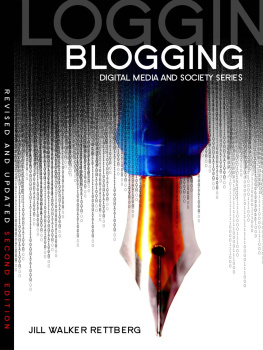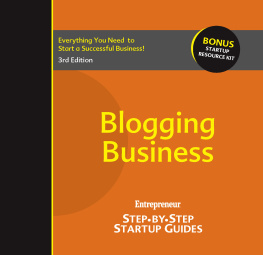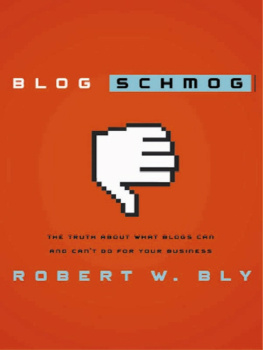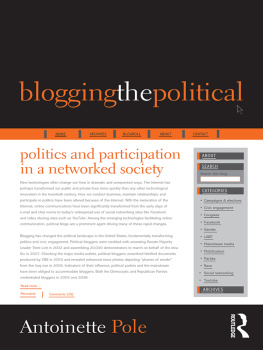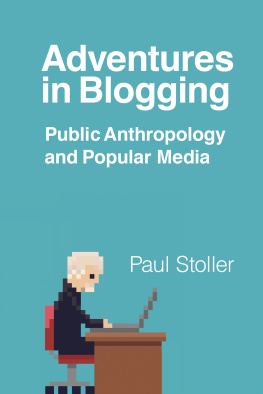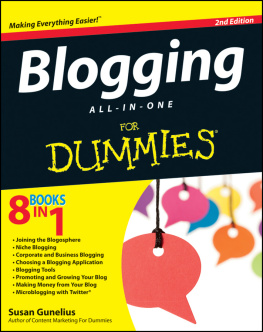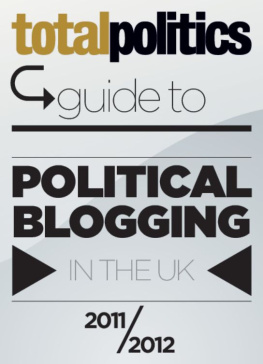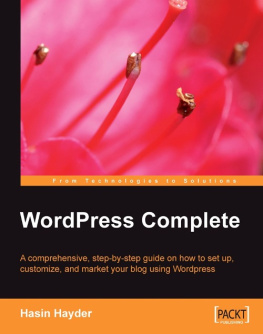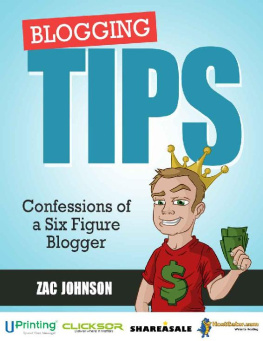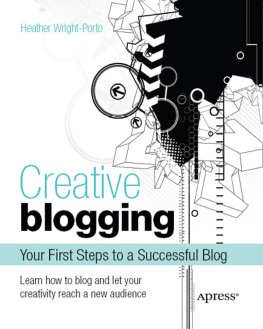Blogging
Second Edition
Digital Media and Society Series
Nancy Baym: Personal Connections in the Digital Age
Jean Burgess and Joshua Green: YouTube
Mark Deuze: Media Work
Charles Ess: Digital Media Ethics, 2nd edition
Alexander Halavais: Search Engine Society
Graeme Kirkpatrick: Computer Games and the Social Imaginary
Martin Hand: Ubiquitous Photography Robert Hassan: The Information Society Tim Jordan: Hacking
Leah A. Lievrouw: Alternative and Activist New Media
Rich Ling and Jonathan Donner: Mobile Communication
Donald Matheson and Stuart Allan: Digital War Reporting Dhiraj Murthy: Twitter
Zizi A. Papacharissi: A Private Sphere
Jill Walker Rettberg: Blogging, 2nd edition
Patrik Wikstrm: The Music Industry, 2nd edition
Copyright Jill Walker Rettberg 2014
The right of Jill Walker Rettberg to be identified as Author of this Work has been asserted in accordance with the UK Copyright, Designs and Patents Act 1988.
First edition published in 2008 by Polity Press
This second edition first published in 2014 by Polity Press
Polity Press
65 Bridge Street
Cambridge CB2 1UR, UK
Polity Press
350 Main Street
Malden, MA 02148, USA
All rights reserved. Except for the quotation of short passages for the purpose of criticism and review, no part of this publication may be reproduced, stored in a retrieval system, or transmitted, in any form or by any means, electronic, mechanical, photocopying, recording or otherwise, without the prior permission of the publisher.
ISBN: 978-0-7456-7131-4
A catalogue record for this book is available from the British Library.
The publisher has used its best endeavours to ensure that the URLs for external websites referred to in this book are correct and active at the time of going to press. However, the publisher has no responsibility for the websites and can make no guarantee that a site will remain live or that the content is or will remain appropriate.
Every effort has been made to trace all copyright holders, but if any have been inadvertently overlooked the publisher will be pleased to include any necessary credits in any subsequent reprint or edition.
For further information on Polity, visit our website: www.politybooks.com
Contents
Acknowledgements
Without the constant conversations with the readers of my blog and with other bloggers, and the inspiration of reading blogs throughout the blogosphere, this book wouldnt have existed. I love social media and am immensely grateful to those early bloggers and to the people who made the first blogging software, thereby opening up a new field and to the visionaries, dabblers and practitioners who came before them. A visit to Blogger.com made me aware, back in October 2000, that anyone, even I, could easily make a blog. That opened new worlds to me.
While writing this book, I had the support of my colleagues at the University of Bergen, particularly in Digital Culture, and I would like to thank everyone there for years of conversations and ideas. I also spent a month at the University of Western Australia, finishing the first edition of the book while a guest researcher at the Department of Communication Studies. Tama Leaver (of tamaleaver.net) was especially helpful during my stay in Perth, reading most of the chapters and making many valuable suggestions for additions and reorganizations. I also received useful comments from Ingeborg Kleppe at the Norwegian School of Economics and Business Administration. Working on the second edition, Ive been able to draw upon feedback from my own students and from others who have taught and read the book. Thank you for all the help youve given me!
My editor at Polity Press for the first edition of this book, Andrea Drugan, was an inspiration and support throughout the process of writing this book, from working out the synopsis to finishing the manuscript. Her feedback was always rapid and helpful. Ive also appreciated the comments Ive received from the reviewers, which have helped me to make many improvements to the manuscript. Working on the second edition, Ive had excellent support from editors, copy-editors and proof-readers at Polity: thank you!
Thank you also to Rand Corporation for permission to reprint the diagram from Paul Barans paper, and to Jason Kottke for permission to use a screenshot from his blog.
And of course, my deeply loving thanks to my family, especially to my wonderful children: my teenager whose own writing online is an inspiration to me and my two little ones born after the first edition of this book was published. First and last, thank you to my wonderful husband and colleague Scott Rettberg for suggesting great examples and discussing ideas along the way, for reading the manuscript several times and giving me very useful pointers, and for being a splendid partner in every way.
JWR
Introduction
Fifteen years ago, the word blog didnt exist. Ten years later, mainstream media routinely used the word without bothering to explain it. Weblogs have become part of popular consciousness with a speed that is remarkable by any standard. What is this new form of communication that so suddenly entered our culture?
I began blogging in October 2000, when I was working on my PhD thesis, and Ive been blogging ever since. Like most bloggers, I learnt about blogging by doing it. Blogging is as much about reading other blogs as about writing your own, and the best way to understand blogging is to immerse yourself in it. However, blogs are also a part of a larger context. They are part of the history of communication and literacy, and emblematic of a shift from uni-directional mass media to participatory media, where viewers and readers become creators of media. Blogs are also part of the history of literature and writing. A path can be traced from early autobiographical writing through diary writing and memoirs up to the confessional and personal diary-style blogs of today (Serfaty 2004). Blogs are part of the current changes in journalism and in marketing. They are part of the growth of social networks like Facebook and Twitter, which in their turn have roots in the social network theory put forward by sociologists in the 1960s and 1970s, as well as in the network structure of the internet, which was designed around the same period.
Blogs are founded upon the link, building connections between related issues. Blogs are themselves related to many different contexts and can be interpreted from many different disciplines: media studies, the history of technology, sociology, ethnology, literary studies, marketing, journalism and more. Furthermore, blogs can function as a lens with which to see how all these fields have developed up until today, and with which we can understand more about other related social media.

